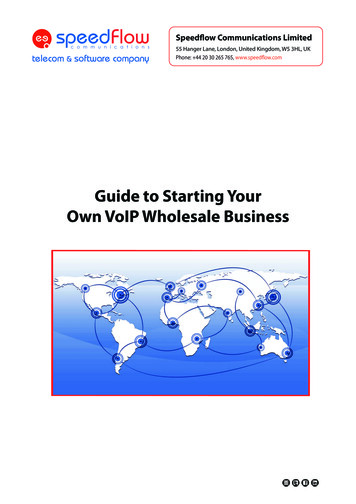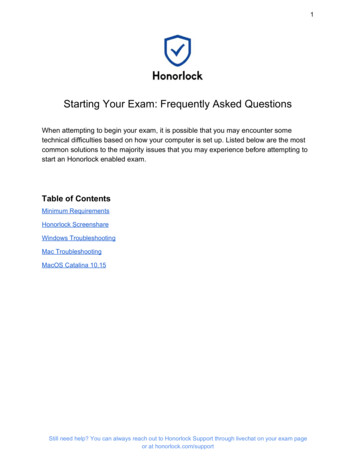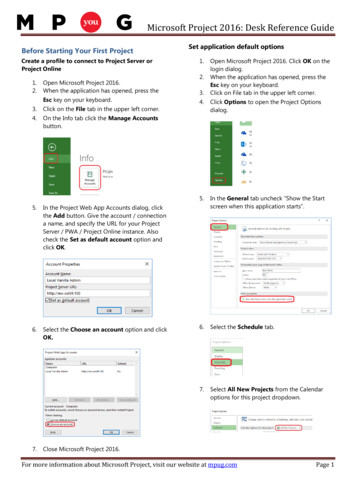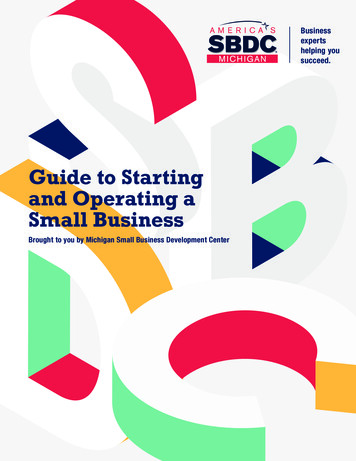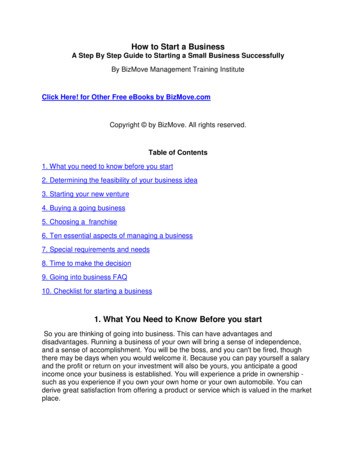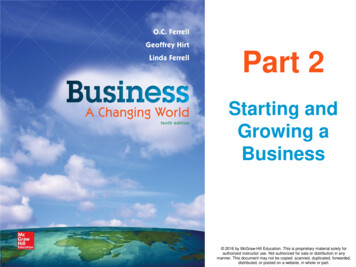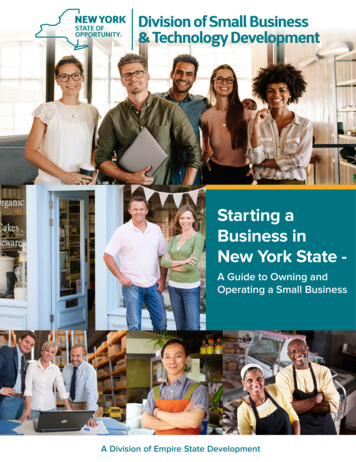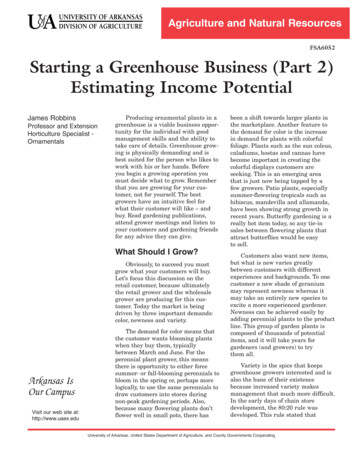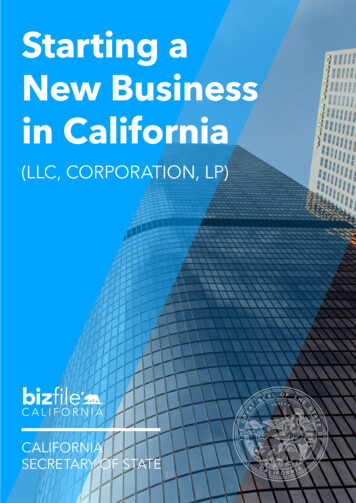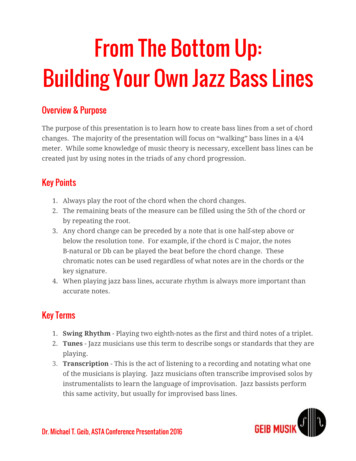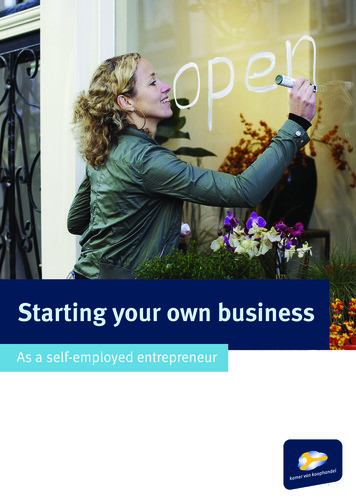
Transcription
Starting your own businessAs a self-employed entrepreneur1
Content1Introduction32Starting your own business43Business plan84Employment law issue95Legal ss premises39Publications in English45Dutch government websites46Chamber of Commerce, December 2014
1 IntroductionWhen you have decided to start your own business a new world is opening up, with a wide varietyof possibilities. You could open a shop or start your own consultancy firm; become a full-time or apart-time entrepreneur. Clients may wish to hire you for advice or construction work.Before plucking up which is planted, there is a time to plant. In other words: you will have to beprepared to tackle challenges as well - either as a provider of services or products, as a self-employedentrepreneur, a sole trader, an independent contractor, or as a freelancer or so-called ‘zzp’er’.The Dutch Chambers of Commerce are incorporated under public law and, as such, target theirservices at Dutch businesses across all sectors.Being self-employed radiates a pleasant sense of freedom and independence, but it may carrycertain risks as well. Whether you offer services or products: you will do so at your own risk,expense and with full responsibility towards third parties. Apart from that, being self-employedentails certain obligations, such as paying taxes and VAT and keeping records of your businessactivities. Preparing well is the best way to start. You are definitely not on your own; plenty ofcompetent assistance is to be found in the Netherlands’ business world.Starting pointBefore you visit the Chamber of Commerce to register your enterprise, do consider the followingissues carefully: a permit to start a business in the Netherlands (only for nationals who originate from outsidethe EU/EEA or Swiss); a business plan; legal form and trade name of your enterprise; taxation and necessary insurance; business location, commercial lease; a (model) agreement (modelovereenkomst) in order to have certainty about the nature of theworking relationship.3
2 Starting your own businessIf you would like to start a business in the Netherlands and you do not have the Dutch nationality and you are from outside the EU, you will have to comply with particular IND (Immigratie- enNaturalisatiedienst, the Dutch Immigration Authorities) formalities.Dutch Immigration AuthoritiesThe legal form of your enterprise makes no difference for the rules’ applicability to the DutchImmigration Authorities: whether it is a one-man business, a Dutch private limited (BV), or abranch-office of a foreign company. The rules do not differ either if you start an enterprise shortlyafter arriving in the Netherlands, or after having been employed in the Netherlands for some time.EU, EEA and Swiss nationalsWhen a national of one of the EU Member States, the EEA (European Economic Area), or a Swisscitizen, you are free to live and work on a self-employed basis in the Netherlands and do not need anentry visa or a residence permit (Document Duurzaam Verblijf). Even if you are not obliged to registerwith the IND, please do so because most authorities ask for a proof of registration when you requestfor a Dutch public healthcare insurance, a healthcare, housing or childcare allowance, a mortgage,or a phone subscription. Registration is free of charge. If you intend to stay over four months, you arerequired to register at your local municipality. An expat center will help you out here.Nationals of non-EU and non-EEA countriesIf you are not a national of an EU or EEA country and not Swiss, you will need to apply for a residence permit in case you stay longer than three months in the Netherlands. A residence permitcan be obtained from the IND.If you are a national of a country subject to the Dutch visa requirement for a more than threemonths’ stay, you will have to apply for a special visa: a provisional residence permit, an MVV(Machtiging Voorlopig Verblijf). You cannot authorize somebody else to apply on your behalf; youwill have to apply for a provisional residence permit in person at a Dutch embassy or consulatein any country, as long as you have lawful residence in that particular country. Lawful residencemeans that you have a residence permit for that country valid for at least another three months.With just a tourist visa, you do not qualify as a lawful resident.4
TipsCheck how you can use your degree or diploma for your business in the Netherlands.Search for ‘international credential evaluation’ at www.idw.nlThe Expatcenter Amsterdam is located in the World Trade Center (WTC) in Amsterdam’sZuidas district.E welcome@expatcenter.iamsterdam.comT 31 (0)20 254 79 99TaxesAn expatriate transferred to the Netherlands will become subject to Dutch income tax either as aresident or nonresident taxpayer. The 30% tax facility allows the employer to grant a tax-free lumpsum allowance for the extra costs of the expat’s stay in the Netherlands (extraterritorial costs).TipSearch for ‘30% tax ruling’ at www.answersforbusiness.nlT 31 (0)20 254 79 99Working on a self-employed basis as national of non-EU / non-EEA country and non-SwissIn this case you will have to meet several economic criteria before starting an enterprisein the Netherlands: you are qualified to run the business in question; you have a business plan; your business serves an essential Dutch interest, i.e. has ‘added value’ to the Netherlands.The IND does not weigh these criteria itself; the Ministry of Economic Affairs is requested to reviewyour situation and to decide whether the business you intend to run will be economically interesting.If this turns out not to be the case, you cannot start your own business in the Netherlands.5
Review of economic added valueThe Ministry of Economic Affairs awards points for each criterion. You will need a minimum of30 points for each criterion (total number for all criteria: 300). The scoring system consists of three parts:a) personal experience (education, experience as a self-employed person, working experience);b) business plan (market analysis, product/stervice, price, organisation, financing);c) material economic purpose for the Netherlands (innovative, job creation, investments).You should always contact the IND to find out about the procedure involved in testing the economicinterest of the enterprise you intend to start. For nationals of some country, you can bring this enterprise to however European Regulations 68/151EEG countries, for example Turkey, special rules onthe basis of treaties between the EU and these countries. To citizens of United States of America it isimportant to know about the so called ‘Amerikaans vriendschapsverdrag’.6
Taking your business from abroadThe Dutch comparative companies Act recognises all foreign legal entities except business ownedby one person (female/male). If you run a one-man business in your country of origin and you canprove this, for example by submitting a copy of registration in a commercial register in that country,you can bring this enterprise to the Netherlands and have it registered at the Chamber of Commerceas a Dutch one man-business.Other legal foreign entities or foreign business forms are simply registered as a foreign legalentity with commercial activities. Please note that you will still have to comply with the IND ruleson residence in the Netherlands.Starting a branch office in The Netherlands is also a possibility. There is question of a branchwhen long-lasting business operations are conducted in the Netherlands, which form part of theforeign enterprise. A branch can be: a sales office or a production company, but also a representativeoffice. It does not have an independent legal form, but is a part of the foreign enterprise.Thanks to our traditionally open economy, attractive investment climate and international taxpossibilities, the Netherlands is and always has been host to many foreign enterprises. Anotherpleasant aspect is the “incorporation principle”, i.e. Dutch law recognises foreign legal entities.In other words: the foreign legal entity wishing to start activities in the Netherlands needs not beconverted into a Dutch legal form. The organisation and structure of the legal entity is governedby the foreign law under which it was formed. National law of the state of origin applies, howeverEuropean Regulations 68/151EEG and 89/666 EEG are specific rules how to register companiesformed in the European Economic Region.TipAdditional information about opening a branch or representative office in the Netherlandscan be obtained at the Chamber of Commerce Amsterdam.Additional information about hiring or provision of workers in the Netherlands is available at:www.kvk.nl/registrationlaw and www.answersforbusiness.nl7
3 Business planStarting a business requires a number of steps and key decisions. The process of creating abusiness plan enables you to look at your business in its entirety. No matter how small or big thebusiness, it will help you identify areas of strengths and weaknesses.Banks require a business plan when you take out a loan. Even if you do not need the latter, andfinancing your enterprise is not a problem, a business plan will definitely help you understandthe impact of starting a business. It will significantly contribute to the professional and efficientstart-up of your enterprise. Submitting a business plan is also one of the criteria set for non-EUand non-EEA nationals to be allowed to start their own enterprise in the Netherlands.Records show that enterprises started upon a thoroughbusiness plan are more likely to be successful.Get startedIt is advisable to write the plan yourself. In doing so, you will gain a better understanding of yourobjectives, targets and future customers or clients. Crucial question to be addressed are: which legal form will best suit the enterprise?; which products or services will you offer – DO’s and DON’Ts?; who will be your clients?; promotional activities to get contracts?; how to optimize visibility to your target group?; which prices and fees?; financial plan (available budgets, expected turnover, investments)?; which insurances do you need?; permits and/or licenses required?; administrational organisation, which form?; what should be included in your General Terms and Conditions – if applicable?FormatsBusiness plan formats can be obtained from various private parties that specialise insupporting starters. Just take a look on the internet or download an example from:www.sba.gov/tools8
4 Employment law issueYour legal status as a self-employed entrepreneur is quite different from an employee’s status.If you are hired on the basis of an employment contract, your employer is the one to deducttaxes from wage and pay national insurance and employee insurance contributions.As an independent entrepreneur you pay taxes and contributions yourself, and you are not entitledto the following employers’ rights: minimum wage, paid holidays, a holiday allowance, statutorysafeguards against dismissal and a statutory notice period. In order to designate the employmentrelationship while starting your business, it is important to consider different contracts and use forexample the (model) agreements (modelovereenkomsten) the Tax Administration.Important, neither party have the obligation to use amodel agreement (modelovereenkomst).Employment on the basis of a contract and implied employmentRegardless of the title chosen for the contract with your client, it is considered an employmentcontract if the following criteria are met: your remuneration for the work performed can be seen as wages; there is an obligation to do the work yourself: you cannot send someone else to do the job foryou. Having to be available for specific work, e.g. on-call service, will also be considered aswork performed in employment; a relationship of authority: the employer can determine where, when and how the work should becarried out. This relation also exists if the work you do is an essential element in the employer’sbusiness operations or if the employer’s profitability is at risk without you.If the working relation does not show all characteristics of a ‘proper’ employment relation, it maystill be seen as one. This is called a notional employment relationship: although the employmentrelation has not been established explicitly, there is an implicit employer-employee relation.Consequently, the fee you charge is seen as wage, so, the employer will have to deduct taxesfrom your wages and pay national insurance and employee insurance contributions.9
A notional employment relation exists if: you work for a client project for at least two days a week; you earn more than 40% of the minimum wages for the project a week; the relation with the client lasts more than 30 days; a new contract within one month after thetermination of the first contract is seen as continuation of the previous contract.A notional employment does not exist if actual and practical independence can be proven,for which a (model) agreement (modelovereenkomst) can be instrumental.Commercial contractsAs a self-employed entrepreneur you or your client can initiate to formalise the contractor-clientrelation by entering into a commercial contract. Parties should always insist on putting down thearrangements agreed upon. There are two types of commercial contracts:1. Service agreement - Under this type of contract you are obliged to perform to the best of yourability, committing yourself to do your client’s work without being employed by him. The workis usually classified as ‘services’.2. Contractor agreement - Under this type of contract you have a specific target obligation. Youcommit yourself to produce a concrete, tangible object at a certain price.Criteria for legal independence: Actual circumstances are decisive here. An official statementsigned by client and yourself that the contract is a commercial one is helpful proof. Cri
When you have decided to start your own business a new world is opening up, with a wide variety of possibilities. You could open a shop or start your own consultancy firm; become a full-time or a part-time entrepreneur. Clients may wish to hire you for advice or construction work. Before plucking up which is planted, there is a time to plant .
